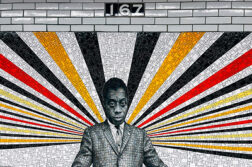
“I’M ON A GREYHOUND BUS, I’m callin’ from a pay phone in Rolla, Missouri, and I’m comin’ to see you.” The accent was as thick as Ozarks molasses. I knew immediately it was my mother. “I want to see you,” she said. “I want to meet Gary.”
This was decades ago, just before Mother’s Day, when I lived in St. Louis. Hearing my mother utter this was the shocking equivalent of picking up the phone to hear Meryl Streep say, “I want to star in the movie based on your book.”
I had come out to my parents months earlier and my rural father had disowned me. After we spoke, he sent me a letter that essentially ended our relationship. I had spoken to my mom only a couple of times over the past few months, in her clandestine calls from work, in which she had told me my father was forcing her to choose between me and him. I was anticipating a motherless Mother’s Day, which was excruciating for me.
“What about dad?” I asked.
“He was not willing or able to come with me at this point in time,” she said. “I cannot live another second of my life without my only son in it. I cannot live another second of my life with regret. Life is as short as one blink of God’s eye. It will be over before I know it.”
I started to cry. My mother was running away from home.
As we drove to the bus station, my mind wandered to my childhood.
It was not easy growing up a gay boy in rural America in the 1970s and ’80s. I preferred ascots to overalls, reading to hunting. And yet, my mother taught me to embrace being different, to use the voice and gifts I’d been given, to relish my uniqueness. Her fierce love likely saved my life, especially after my brother was killed in a tragic accident at the age of seventeen, when I was only thirteen. “You must live,” she told me when she left me at college, “so I can live.”
My mother was a nurse and, later in her career, a hospice nurse. She was the Florence Nightingale of our rural town, caring for the wounded and the weak, the lost and hopeless. I accompanied her all over the Ozarks—across creek beds and railroad tracks—to care for those at the end of their lives. She taught me that those at the end of their lives were filled with regrets, things they should have done and said. “Don’t ever live your life with regret, Wade,” she used to tell me.
When Gary and I picked her up, I was petrified. Would she like Gary? Would she still love me?
In the first few seconds of her high-stepping it off the bus (my mother walked at the same speed and with the same gait as a turkey), Gary, a hugger, reached out and grabbed her, holding her body tightly.
“I thought he would be older,” my mother said, looking at me. “Your father said Gary would be a much older, wily gentleman, perhaps in his late fifties.”
“No, he’s younger than me,” I replied. “Despite what dad believes, I was not coerced into being gay. I wasn’t seduced in a back alley. I’ve known forever.”
“Well,” my mother started. “It is nice to meet you finally. Yes, yes, that is correct. Nice to meet you, sir.” I had warned Gary about my mother’s nervous talk, filled with tics and odd tales, but he was charmed. “I love your voice,” he said. “Very Steel Magnolias.”
I held my breath, but my Ozarks mom smiled at Gary, finally embracing him back.
For the next hour, my mother—whose stories always walked a fine line between fact and fiction—told Gary a fictionalized tale about the life of Shirley MacLaine, who, I know for sure, did not star in Funny Girl. She also proceeded to tell Gary about how she believed that, in previous lives, she was Clara Barton, a lioness, and a blind cobbler, not necessarily in that order. Gary told my mother he believed he was an Egyptian goddess, Russian dancer, and close relative to Suzanne Somers, definitely in that order.
I told both of them that I was in hell, but neither laughed because they had already bonded, talking and laughing, like long-lost friends who had reconnected. Despite all of our family drama, there would be no more fights, no anger, no personal drama. That’s the thing when you stop judging and start loving, accepting, and understanding. You are more aware, you live in a place of light, you move forward, not back. No, my mother immediately adored Gary, and he adored her back. Gary and Geri were, in short, a match made in heaven.
By jumping on a Greyhound, my mother made a stand that changed my life, Gary’s life, and the life of my father—who eventually came around not only to accept but to love me and Gary, largely because of my mother’s strength. Over the last 26 years that Gary and I have been together, his parents have given me wonderful gifts my parents could not, and my parents gave Gary things his parents could not.
As we celebrate Pride month, we all must continue to make a stand for what matters in life, regardless of the consequences. When we do, lives are changed, sometimes dramatically, for the better. When we don’t, things remain the same, or get even worse. My mom’s love for and pride in me, and her show of strength when everything could have been lost for her, changed countless lives and continues to have a ripple effect. She lived without regret, as do I do.
My mother passed away in 2009, but when I am down and need a sign of strength and pride—especially in light of all the vitriol in today’s world—I think of my mother buying that bus ticket, jumping on a Greyhound, and running away from home.
Wade Rouse is the author of thirteen books, many of them best-selling novels. His new memoir Magic Season: A Son’s Story is on sale now. He also writes fiction under his grandmother’s name, Viola Shipman, to honor the working-poor Ozarks woman whose memory inspires his writing.







